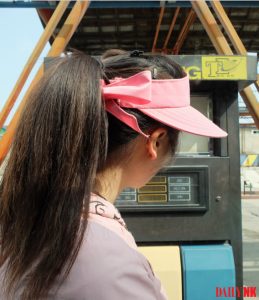The price of refined oil — which had been skyrocketing due to shortages — has recently fallen by more than 50% after the country received supplies of the commodity from China.
According to a Daily NK source in North Korea recently, speaking on condition of anonymity, the price of gasoline and diesel in Pyongyang, as of July 15, was KPW 7,000 and KPW 4,000 a kilogram, respectively.
In the case of gasoline, the price had fallen by 36% compared to July 12, when it was at KPW 11,000 a kilogram. The price of diesel, meanwhile, had fallen 53% (KPW 4,000) from KPW 8,500.
The prices of gasoline and diesel fell in February and early March when the country received imports from China, but they had been climbing until recently.
Early last month, the price of gasoline and diesel climbed to nearly KPW 13,000 and KPW 10,000, respectively.
Multiple sources have reported that North Korea imported refined oil from China immediately after North Korean leader Kim Jong Un and Chinese leader Xi Jinping exchanged letters on July 11 to mark the 60th anniversary of the two countries’ treaty of friendship, cooperation, and mutual assistance.
In his congratulatory message to Xi, Kim said the conclusion of the treaty demonstrated the “firm will of the two parties and the governments and peoples of the two countries to ensure the long-term development of the DPRK-China friendship, which was forged at the cost of blood on the road of independence against imperialism and of socialism on the basis of the solid legal foundations.” He also said it was “the fixed stand of the WPK and the DPRK government to ceaselessly develop the friendly and cooperative relations between the DPRK and China.”

In his letter, Xi said China and North Korea share a firm relationship and that he is “willing to provide greater happiness to the two countries and the two peoples by strengthening the strategic communication with General Secretary Kim Jong Un to properly control the direction of the advance of the China-DPRK relations and by steadily leading the relations of friendship and cooperation between the two countries to a new stage.”
North Koreans aware of the oil imports are reportedly claiming that the shipments represent “China’s response to Kim’s letter.”
North Korea received much of the oil by sea through the port of Nampo, though some of the oil was reportedly imported through the Sino-North Korean pipeline as well.
According to Daily NK’s source, dozens of trucks have been detected coming and going from the Paengma-ri Petroleum Production Storage Facility, the terminus of the PRC-DPRK Friendship Oil Pipeline.
State-allotted shares of oil to the Central Committee, military, state enterprises, and other official bodies were likely imported by sea, while the pipeline was likely used to import oil for civilian use.
The source claimed the most recent shipment of oil far exceeded typical imports of the past.
The source explained that in North Korea, the authorities issue “gasoline tickets” that are used instead of cash to purchase gas at gasoline stations. Considering the number of tickets already issued, it appears the most recent oil import will last more than just a week or two, he said.
Meanwhile, in return for receiving oil from China, North Korea reportedly agreed to provide mineral resources to China at low cost.
“The Chinese side has been asking for mineral resources,” said the source. “It appears exports of magnesia clinker and metals to China will increase going forward.”
















